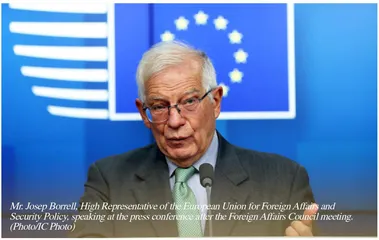EU Strategic Autonomy: Predicament and Way-out
作者: Tian Dewen

In recent years, the European Union (EU) nurtured the concept of “strategic autonomy” and clearly expressed its ambition to act as an independent player globally. At present and in the near future, despite of discord and even quarrels within the EU, the basic consensus on maintaining strategic autonomy still remains. Therefore, the EU will not totally tilt towards the United States (US). However, if the EU truly aims to achieve its goal of strategic autonomy, it needs to change its strategic mindset. Only by abandoning the pursuit of power politics and Cold War mentality and conforming to the trend of world peace and development can it play a more active role in the multipolar world.
The EU won’t totally tilt towards the US
Since the Cold War ended, the strategic mutual trust between European countries and the US was generally on decline. Although Europe is still under the nuclear umbrella of the US and the EU depends crucially on the US in terms of economy, trade, science and technology, it is a near zero-probability event that the EU “allies with the US to dominate”. The US-EU relations hit the bottom during Trump administration. Biden’s high-profile announcement of the “return to Europe” cheered many EU leaders up, but the US concrete actions indicated that Biden’s policy towards Europe still anchored to the “America First” position. After the US’ withdrawal of troops from Afghanistan and France’s fury over the sudden US-Australia nuclear submarine pact, European countries’ dream of substantial improvement of US-EU relations by the Biden Administration dashed. In this context, it is nearly impossible to build a closer “US-EU Bloc”.
First, the strategic mutual trust between the US and EU is obviously diminishing. After the end of the Cold War, both the US and the EU constantly showed the political will to strengthen transatlantic relations, but in fact they basically indulged in empty talk. France and Germany expressed opposition against the US’ decision to send troops to Iraq in 2003, thus deepening the rift between the two sides. France and Germany have been proven righteous and wise at that time, as the US’ war in Iraq caused the lingering turmoil in the Middle East and also triggered the “refugee crisis” in Europe in 2015. On this issue, France and Germany were unable to protect their interests from being jeopardized by the US’ military actions and the US cannot accept the open boycott by France and Germany. The incident thus severely damped the mutual trust between “Old Europe” and the US. Upon this backdrop, France and Germany are pushing for the EU’s strategic autonomy. As said by Josep Borrell, the High Representative for Foreign Affairs and Security Policy of the European Union, “EU wants to be the master of its own destiny”.
Second, the die-hard alliance between the US and the EU no longer exists. In the post-Cold War era, the world political and economic structure has gone through profound changes. Without formidable foreign enemies serving as the “strongest adhesive”, the bloc is on the trajectory of breaking up. The US has clung to anti-terrorism, defending against Russia and containing China as new ties to maintain transatlantic relations, but the results are barely satisfactory. It boils down to three reasons. First, the EU has different perceptions of the US’ “foreign enemies”. The EU is disinclined to give up the substantial benefits gained through pragmatic cooperation with Russia and China merely because of the US’ opposition. Second, in a multipolar world with economic globalization, it becomes less cost-effective for the US to bully as the “leader” of the West by throwing its weight internationally, so it has to go through strategic contraction. Third, the US cannot rid itself from unilateralism and hegemonism, placing it in a conflicted position with the EU that pursues “multilateralism”. In fact, 30 years after the end of the Cold War, the US is no longer able to provide the indispensable public goods for the EU, but still behaves as “the leader of the alliance”, which fundamentally damages the cohesion of the transatlantic alliance.
Finally, the EU refuses to be a vassal of the US. History has repeatedly proved that countries will have to pay the price for being a vassal. In any alliance, “hitchhikers” seem to gain short-term advantages, but in fact they enjoy the gratification at the cost of their long-term interests. The leader of the alliance will assert growing dominance, and the allies will be left no choice but to jeopardize their own long-term interests in order to save the vested interests and they will be gradually deprived of choices concerning the actions of the alliance. But in turn, the diminishing power of allies will be a drag on the alliance’s ability to act, and ultimately harm the interests of the leader of the alliance. In the EU’s A Global Strategy for European Union’s Foreign and Security Policy themed “Shared Vision, Common Action: A Stronger Europe” and released in June 2016, “strategic autonomy” is defined as “the ability to set its own priorities and make its own decisions on foreign and security policy”. This perception indicates that the EU is soberly aware that even within the transatlantic alliance, the inability to act independently will seriously dampen its own interests.